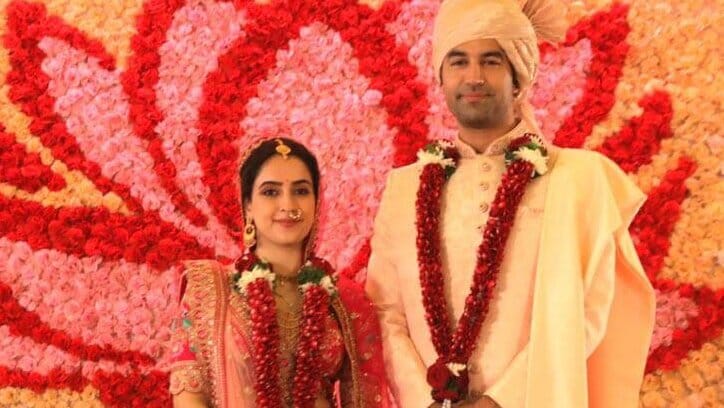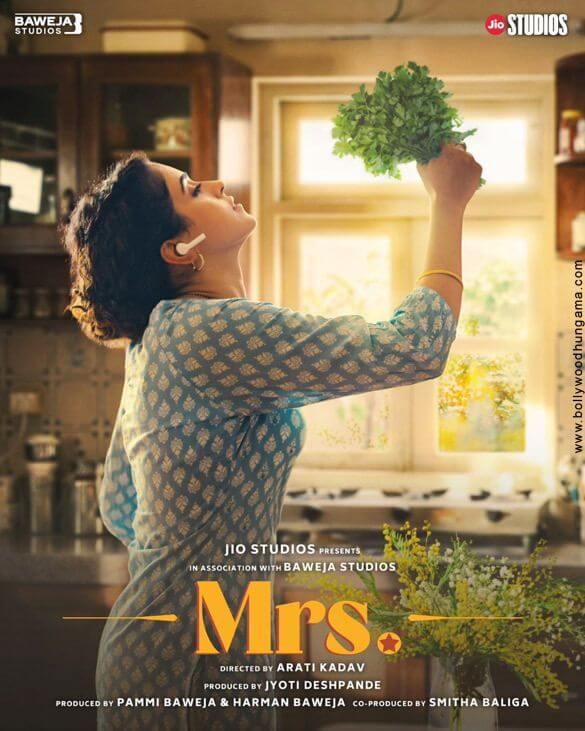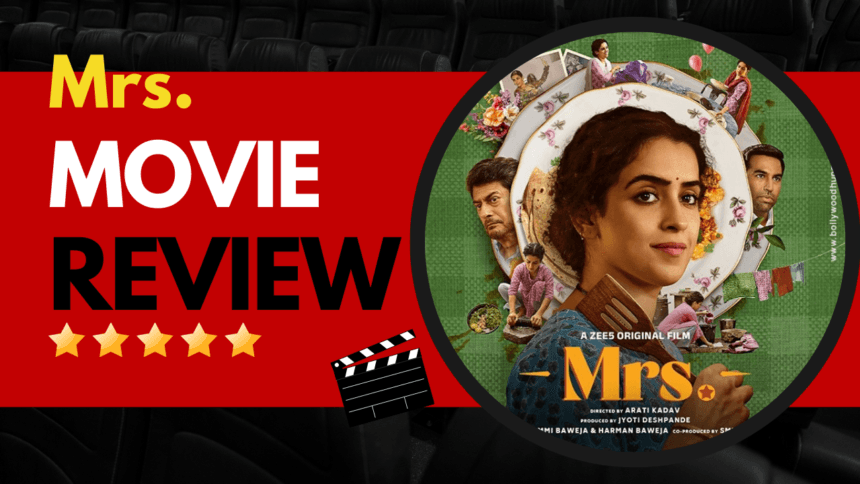2025 film Mrs., which stars Sanya Malhotra, It is a Hindi version of a Malayalam movie The Great Indian Kitchen (2021).
Mrs. is a startling depiction of the unsaid battles that many women face inside the walls of marriage.
That too with a keen critique of gender norms and a thorough examination of patriarchal oppression.
The film, which debuted on ZEE5 on February 7, 2025, has generated conversations about women’s autonomy, cultural expectations, and the often-overlooked emotional labor that goes on in households.

Plot summary
The movie centers on Richa (Sanya Malhotra), a teacher and talented dancer.
Eho marries a wealthy doctor named Diwakar (Niraj Madhav) through an arranged marriage.
At first, Richa welcomes her new life with hope, trying to reconcile her love of dancing with her responsibilities as a wife.
But she quickly finds herself caught up in the never-ending cycle of cooking, cleaning, and meeting her husband’s and in-laws’ irrational demands.
As the days go by, tradition starts to weaken Richa’s sense of self.
It is expected of her to put her husband’s wants ahead of her own passion, career, and even sense of self.
She feels oppressed by her new home’s strict regulations and begins to doubt the life she is leading.
The entitlement that is engrained in traditional Indian marriages is embodied by her husband.
Who, albeit not being explicitly cruel, views obedience and submission as the inherent qualities of a “good wife.”
Richa makes a daring choice that defies social conventions and reclaims her independence after gradually realizing that she is losing herself.
Performances and direction
It’s one of Sanya Malhotra’s strongest performances to date.
Her portrayal of Richa’s journey is subtle yet incredibly emotional.
The movie conveys her suffering, annoyance, and silent opposition through her body language, subtle facial expressions, and quiet moments.
Many sequences lack direct conversation, which heightens the effect of her performance.
It gives the spectator a sense of her powerlessness and suffocation.
The original Malayalam tale is expertly replicated by director Arati Kadav.
She makes Mrs. more approachable for a larger audience while maintaining its thought-provoking qualities.
The film’s cinematography is essential to its plot; recurring images of Richa going about her everyday tasks emphasize how boring her existence is.
While prolonged close-ups show her inner struggle.
It is admirable how Kadav can infuse tension into even the most straightforward family moments.

Themes and Social Commentary
Mrs. is essentially a critique of the deeply embed patriarchal systems that determine a woman’s place in a marriage.
Instead of showing overt abuse or violence, the movie highlights the commonplace microaggressions that support gender inequity.
The way that women are expected to give up their identities for the sake of maintaining family unity is highlighted by Mrs.
From the requirement that Richa serve meals before eating herself to the casual disregard of her goals.
The notion of quiet rebellion is also explored in the movie.
Richa’s opposition is subdued yet profound rather than characterized by noisy clashes.
Her ultimate act of rebellion aims to restore her freedom and sense of value in addition to leaving her controlling marriage.
Even intelligent, supposedly forward-thinking men like Diwakar uphold antiquated customs.
Without challenging them, a fact that the film indirectly criticizes.
Cinematography and soundtrack
Mrs.’s cinematography is essential to expressing its ideas.
In order to highlight the monotonous routine of Richa’s life, the camera frequently lingers on domestic tasks.
The sharp contrast between the life she desires and the one that is forced on her is highlighted in the film.
The background music is simple but powerful, letting the quiet do the talking.
The atmosphere Richa finds herself in is amplified by the sound design’s capturing of the basic yet overwhelming sounds of a home.
Such as pressure cookers whistling, kitchenware clanking, and wall clocks ticking.

Strength and weakness
The realistic depiction of patriarchy in the movie is one of its greatest advantages.
Instead of using dramatization or overblown confrontations, it highlights the subtle ways in which women are socialized to fit in.
Because of the screenplay’s precise writing, each scene has a specific function.
Because of Sanya Malhotra’s acting, the movie is elevated and Richa’s journey becomes incredibly realistic and intimate.
However, some viewers may not enjoy the film’s plodding tempo.
Although deliberate, the presentation of household activities repeatedly might occasionally feel tedious.
It could also be argued that the film’s resolution is too subdued and doesn’t provide the dramatic closure that most viewers anticipate.
However, these components also add to the film’s realism, which makes it inspiring and thought-provoking.
Final verdicts
Mrs. is a significant film that compels viewers to consider the invisible hardships that women in conventional homes bear.
It is more than just a tale of one woman’s hardship; it offers a window into the everyday lives of innumerable women from many countries.
Sanya Malhotra’s outstanding performance and Arati Kadav’s directing make Mrs. a must-see for anybody looking for meaningful film.
With its gripping story, outstanding acting, and potent social critique, Mrs. is one of the most influential movies of 2025.
Viewers are prompted to reevaluate their long-held assumptions about gender roles and what makes a “good wife.”
Mrs. is a great movie to watch if you want something that is both thought-provoking and emotionally impactful.
Rating: 4.5/5
Also check: Must watch korean drama









